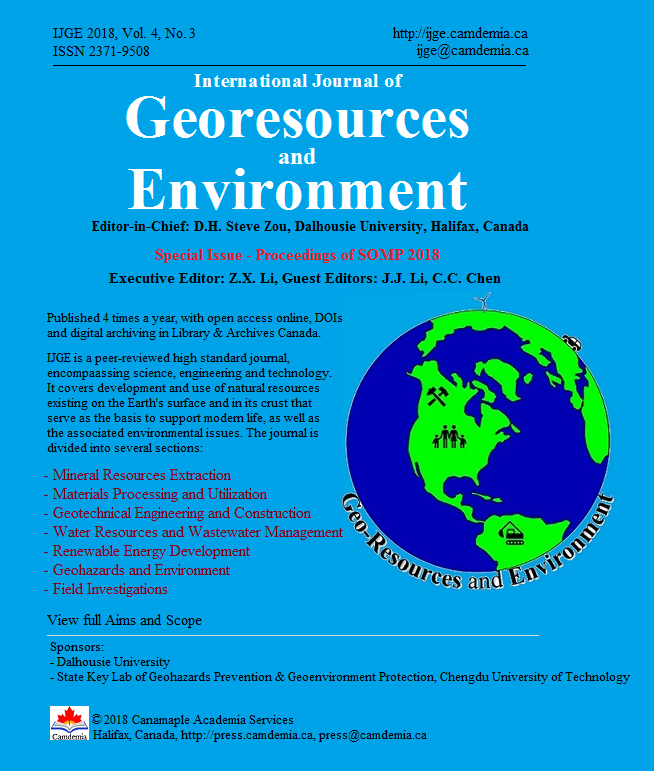Capacity Building Initiatives in Mineral Education in Southern Africa: Opportunities for Collaboration
DOI:
https://doi.org/10.15273/ijge.2018.03.029Keywords:
capacity building, challenges, collaboration, sustainability, researchAbstract
Many countries in Southern Africa are generally endowed with a wealth of minerals. For example, South Africa and Zimbabwe are host to approximately 80% of the world's Platinum Group Minerals (PGMs) and chromite resources. Vast deposits of coal, both thermal and metallurgical, occur and are mined in significant quantities in Botswana, Malawi, Mozambique, South Africa, Zimbabwe and Zambia. However, the region has over the years experienced a shortfall in skilled personnel as well as well-resourced training institutions to convert the comparative advantage arising from the rich mineral endowment to a competitive advantage through efficient extraction, beneficiation and value addition. In recent years, Governments in the sub-region have responded to this unfavorable situation by opening a number of universities and other tertiary institutions focussing on educating and training a new generation of mineral professionals. This study reviewed the recent developments in the region and assessed the extent to which capacity shortfalls are being addressed in the minerals sector. The methodology included questionnaires and interviews, and the analysis was mainly qualitative. The main findings of the study were that although several mineral education institutions were being opened in the region, there is an inadequate number of professionals in the mining and minerals field in the region for teaching and research, and there are few well-equipped modern facilities for teaching and research such as laboratories and lecture rooms. This situation presents an opportunity for collaborative initiatives, not only within the region but internationally, aimed at addressing these shortfalls and ensuring that appropriate skills are developed for the mining industry and also for the academic institutions.Downloads
Published
Issue
Section
License
Copyright, Terms and Conditions
The International Journal of Geohazards and Environment (the Journal) is published by Canamaple Academia Services (the Publisher) online with open access, under a Creative Commons Attribution-Noncommercial license (CC-BY-NC) (http://creativecommons.org/licenses/by-nc/4.0/). Authors (the Authors) submitting papers (the Work) for publication in the Journal automatically agree to the following terms and conditions.
1. Under the license (CC-BY-NC), Authors give permission for others to share and reuse the Work, as long as the original source and author(s) are properly cited (i.e. a complete bibliographic citation and link to the Journal website) and the material is not used for commercial purposes. Any sharing or reuse must however indicate the original CC-BY-NC license terms of the work.
2. Authors transfer and assign to the Publisher all copyright in and to the Work. However Authors retain all proprietary rights except the copyright, related to the Work and also retain the rights a) to use, reproduce, distribute, and publicly display the Work in any medium in connection with the Authors‘ academic and professional activities, such as teaching, presentations and lectures, b) to create derivative works from the Work and to make full use of the Work in future research and publications, c) to authorize others to make any non-commercial use of the Work, d) to make both the pre-published and final-published versions available online in institutional and/or disciplinary repositories or on their own websites with a citation and link to the original paper published in the Journal.
3. Authors warrant that the Work is their original work, it is not copied from anywhere or anyone else, they are totally responsible for the authenticity, originality, validity and accuracy, and the facts and views are their own, that the Work contains no matter which is defamatory or infringes any literary or proprietary rights, intellectual property rights, or any rights of privacy, and that the Work has not been simultaneously submitted to any other journals or publishers. Authors further agree that their manuscripts whether accepted or rejected will not be returned and the rejected manuscripts will be disposed at the journal editor's discretion.
Disclaimer: The Publisher, the Journal and the editors accept no responsibility for statements or opinions expressed by authors. Use of information and materials in the Journal is the sole responsibility of users.


